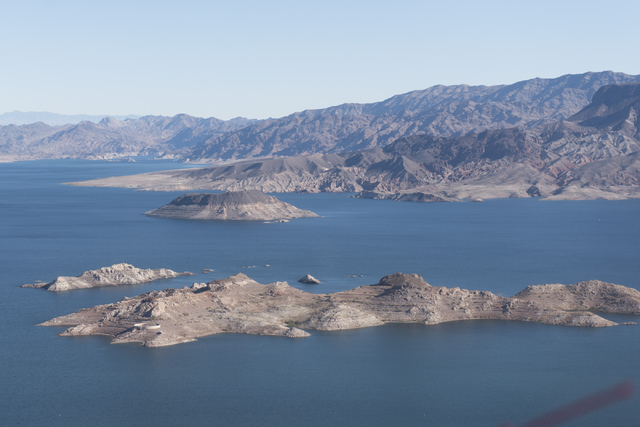Heavy winter fall will likely prevent Lake Mead shortage for 2018
With snow piling up in the mountains that feed the Colorado River, the short-term outlook for Lake Mead has suddenly improved.
But new research warns of more trouble ahead.
First the good news: Federal forecasters now expect the reservoir to avoid its first federal shortage declaration next year, thanks to the boost it should get from what could wind up as the wettest winter on the river’s basin in 20 years.
“We’re in for a good year, no doubt about it,” said Randy Julander, snow survey supervisor for the U.S. Department of Agriculture’s Natural Resources Conservation Service in Salt Lake City.
Storms in Utah, Colorado and Wyoming over the past month have added more than 3 million acre-feet to the water supply forecast for the Colorado. That’s a 10-year supply for Nevada, which gets 300,000 acre-feet from the river each year.
SHORTAGE DECLARATION UNLIKELY
The latest forecast from the National Weather Service’s Colorado Basin River Forecast Center calls for the surface of Lake Mead to start 2018 about 3 feet above the trigger line for a shortage declaration that would force Nevada and Arizona to reduce their river use.
Projections in January called for slightly below average flows on the Colorado through this summer, resulting in an 11-foot drop that would take the lake below the shortage line.
Forecasters now expect 9.6 million acre-feet of snowmelt — 134 percent of the average for the past 30 years — to make its way into the river between April and July.
One acre-foot of water is enough to supply two typical Las Vegas area homes for just over a year. The Colorado River provides water to some 40 million people in the U.S. and Mexico.
Some monitoring stations on the western slope of the Rocky Mountains show roughly twice as much snow as usual for this time of year, and Julander said it is very wet and “ripe” to begin melting into the river system.
“We’ve seen a dramatic and substantial increase in snowpack and soil moisture,” he said. “January and February were absolutely outstanding. It feels good to say that.”
Heavy snow and rain in California also could take some pressure off the overburdened Colorado. The Golden State draws more water from the river than anyone and might be able curb its use and store more of its supply in Lake Mead now that its own reservoirs are filling again following heavy rains in the lowlands and snowfall in the Sierra Nevada.
STUDY: FLOW COULD BE CUT IN HALF
Just as forecasters were upgrading their near-term projections, researchers unveiled bleak new findings in late February suggesting that climate change has already diminished the Colorado and could cut its flow in half by the end of the century.
The authors of the report, Jonathan Overpeck of the University of Arizona and Bradley Udall of Colorado State University, said the river has lost at least 500,000 acre-feet of annual flow as a result of global warming over the past 17 years.
The losses will only increase as temperatures continue to rise and “mega-droughts” lasting 20 years or longer become more likely, research indicates.
Lake Mead was nearly full when the current drought took hold on the Colorado in 2000. Since then, the surface of the reservoir has dropped 128 feet.
“This paper is the first to show the large role that warming temperatures are playing in reducing the flows of the Colorado River,” said Overpeck in a written statement. “We’re the first to make the case that warming alone could cause Colorado River flow declines of 30 percent by midcentury and over 50 percent by the end of the century if greenhouse gas emissions continue unabated.”
“The future of Colorado River is far less rosy than other recent assessments have portrayed,” added Udall. “A clear message to water managers is that they need to plan for significantly lower river flows.”
The research was funded by the Colorado Water Institute, National Science Foundation, the National Oceanic and Atmospheric Administration and the U.S. Geological Survey.
Their findings have been accepted for publication in Water Resources Research, a journal of the American Geophysical Union.
Contact Henry Brean at hbrean@reviewjournal.com or 702-383-0350. Follow @RefriedBrean on Twitter.














